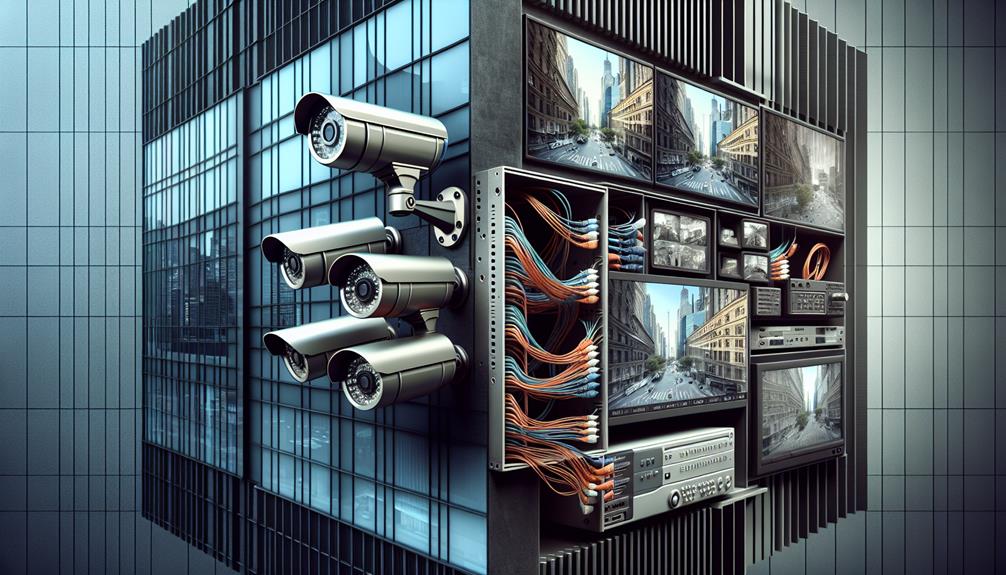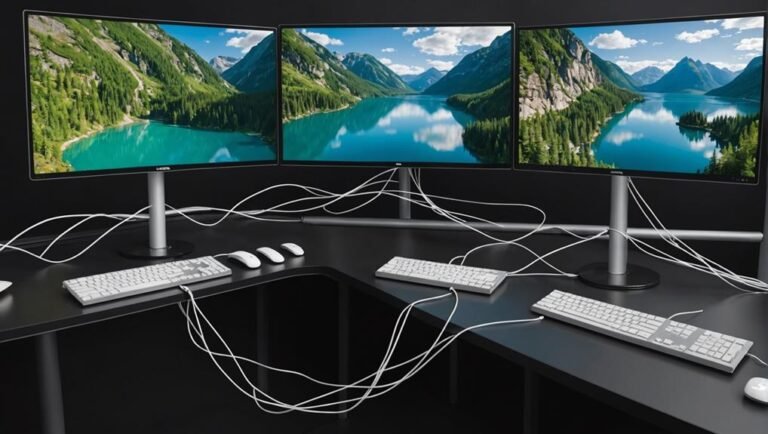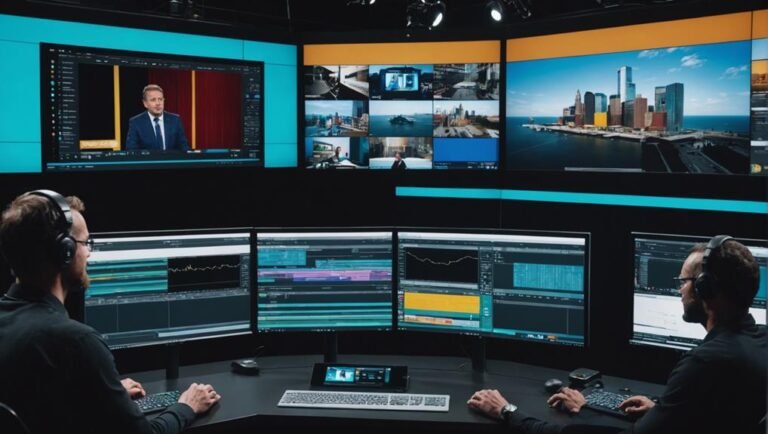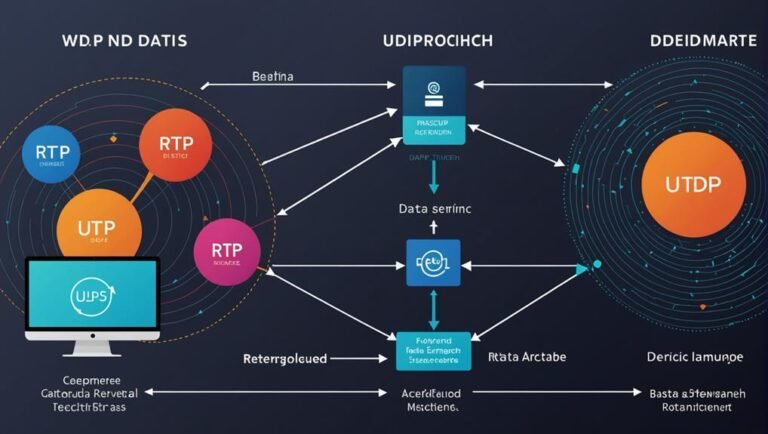When choosing between CCTV and DVR, know that CCTV refers to closed-circuit television, which encompasses various camera systems for surveillance. DVR, or digital video recorder, specifically handles recording and storing footage digitally. CCTV systems offer higher upfront costs but greater scalability and clearer video quality thanks to digital signals and modern IP cameras. DVR systems are generally more budget-friendly initially but may require significant upgrades for expansions. DVR allows for remote access and local storage, whereas CCTV often utilizes cloud storage for remote monitoring. If you want to get into the finer details, there’s more ahead.
What Is CCTV?
CCTV, or closed-circuit television, is a system that allows you to monitor and record activity in specific areas using video cameras. Imagine having the capability to keep an eye on your property, guaranteeing your freedom from worry about unwanted intrusions. With CCTV, you gain control over your surroundings, reducing your reliance on others for security.
Setting up a CCTV system is straightforward. You install cameras at key locations like entry points, driveways, or common areas. These cameras transmit footage to a dedicated monitor, where you can review live or recorded video. This lets you act swiftly if something seems off, giving you the upper hand in protecting your freedom and assets.
CCTV systems often come with features like motion detection, night vision, and remote access via smartphones or computers. These enhancements ensure you’re not confined to one spot; you can check in from wherever you are, expanding your sense of freedom. Whether you’re safeguarding your home, business, or personal space, CCTV provides a reliable way to stay informed and in control. Embrace the liberty of knowing you’re always connected to what matters most, without sacrificing your independence.
What Is DVR?
While CCTV cameras capture the footage, DVR, or digital video recorder, stores and manages that footage efficiently. You don’t have to worry about missing out on important moments because the DVR guarantees everything is recorded and accessible. This device takes the raw data from your CCTV cameras and converts it into a digital format. It’s like having a digital archive at your fingertips, making it easy to review past events whenever you need.
You can set up your DVR to record continuously, on a schedule, or when motion is detected. This flexibility allows you to tailor your security system to fit your lifestyle and needs. Want to review what happened while you were away without sifting through hours of footage? Motion detection recording has got you covered.
DVRs also come with user-friendly interfaces. You can easily navigate through recordings, back up important clips, and even share footage if necessary. Plus, many modern DVRs offer remote access, letting you check in from anywhere via your smartphone or computer. It’s all about giving you the control and freedom to monitor your space on your terms. No more feeling tied down; your security stays in your hands.
Key Differences
When comparing CCTV systems and DVRs, the key differences lie in how they process, store, and manage video footage. CCTV, or Closed-Circuit Television, is a broad term that encompasses various types of camera systems used for surveillance. DVR, or Digital Video Recorder, specifically refers to a device that records video in a digital format.
First, let’s talk about processing. CCTV systems often use analog signals, which DVRs convert into digital formats for storage. This conversion process is important because digital footage is easier to manage and offers better clarity.
Storage is another major difference. Traditional CCTV systems might use tapes or other analog storage methods, which can be bulky and less durable. DVRs, on the other hand, store video digitally, often on hard drives or cloud storage, making it easier to access and manage your footage remotely.
Lastly, how you manage your video footage varies. CCTV systems typically require on-site monitoring, while DVRs allow for remote access and control through internet connections. This gives you the freedom to check your footage from anywhere, anytime, without being tied to a specific location.
Understanding these key differences helps you choose the best system for your needs, especially if you value flexibility and ease of access.
Installation Process
Now that you know the differences between CCTV systems and DVRs, let’s explore how to install each type effectively. For a CCTV system, start by identifying the best locations for your cameras. Think about areas with high foot traffic or important entry points. Mount the cameras securely, ensuring they have a clear view. Run the cables from the cameras to the central recording unit and connect them. You’ll also connect the system to a power source and a monitor for live viewing.
Installing a DVR system follows a similar process but offers more flexibility. You’ll begin by mounting the cameras in strategic locations. Next, run the necessary cables to the DVR unit. Modern DVR systems often support IP cameras, which can connect via your network, reducing the need for extensive cabling. Once connected, plug the DVR into a power source and link it to your network for remote access.
Both installations require some technical know-how, but they empower you with control over your security. Take your time, follow the manufacturer’s guidelines, and soon you’ll have a robust surveillance system tailored to your needs. Enjoy the peace of mind that comes with having your property under watchful eyes.
Cost Comparison
Comparing the costs of CCTV systems and DVR setups reveals significant differences that can impact your budget. When you’re looking for flexibility and control, understanding these cost factors is important. CCTV systems, especially modern IP cameras, often come with higher upfront costs. These include the price of high-quality cameras, network infrastructure, and sometimes, cloud storage fees. However, they offer scalability and remote access, which can be a significant advantage if you value convenience and freedom from physical constraints.
On the other hand, DVR setups tend to be more budget-friendly initially. Traditional analog cameras and DVR units are generally less expensive than their IP counterparts. You might find that the total cost is lower due to fewer network requirements and simpler installation. However, keep in mind that DVR systems might incur additional costs over time, such as maintenance and potential upgrades to keep the system up-to-date.
Ultimately, your choice between CCTV and DVR will depend on your specific needs and long-term financial considerations. If you’re looking for a cost-effective solution with straightforward requirements, DVR might be the way to go. Conversely, if you prioritize advanced features and scalability, investing in a CCTV system could be worth the higher initial expense.
Video Quality
Video quality is a vital factor that differentiates CCTV systems from DVR setups, influencing how clearly you can see and interpret recorded footage. When you need high-definition images, the choice between these two can make a significant difference. CCTV systems often rely on analog signals, which can limit the resolution and clarity of the video. On the other hand, DVR setups usually use digital signals, providing you with crisper, high-resolution footage.
Here’s a quick comparison of video quality features:
| Feature | CCTV | DVR |
|---|---|---|
| Signal Type | Analog | Digital |
| Resolution | Standard Definition | High Definition |
| Image Clarity | Lower | Higher |
With CCTV, you might notice graininess or blur, especially in low-light conditions. DVR systems, however, offer better performance in various lighting situations, delivering sharper and more detailed images. This clarity can be essential if you’re monitoring your property for security reasons, as high-quality footage can make identifying faces or license plates much easier.
Storage Capabilities
Storage capabilities often play a pivotal role in deciding whether to opt for a CCTV or DVR system, as they determine how much footage you can keep and for how long. If you value flexibility, you’ll find that CCTV systems generally offer more storage options. Most modern CCTVs support cloud storage, letting you access recorded footage from anywhere. This means you’re not tied down to a physical location, giving you the freedom to monitor your property on the go.
On the other hand, DVR systems typically rely on local storage, like hard drives. While this option often provides a considerable amount of storage space, it does limit you to accessing the footage where the DVR unit is located. If you’re someone who prefers having everything in one place without worrying about internet connectivity, a DVR could be a solid choice.
However, consider your lifestyle and needs. If you travel often or want to check in on things remotely, CCTV’s cloud storage offers unmatched convenience. But if you prefer a more traditional setup with large storage capacity, DVR systems have you covered. Choose wisely based on how you want to balance storage capacity and accessibility.
Scalability
When it comes to scalability, CCTV systems generally offer more flexibility than DVR systems. With CCTV, you can easily add more cameras without major overhauls. This is crucial if you’re expanding your space or just want to enhance your security coverage. On the other hand, DVR systems often require significant upgrades to accommodate additional cameras, which can limit your freedom to scale as needed.
Here’s a quick comparison to help you understand the scalability differences:
| Feature | CCTV Systems | DVR Systems |
|---|---|---|
| Adding Cameras | Simple, can add one at a time | Complex, may need new hardware |
| Network Capacity | Can expand with minimal disruption | Often limited, needs upgrades |
| Cost of Expansion | Generally low | Can be high due to new equipment |
| Flexibility | High, adaptable | Low, rigid structure |
| Installation Ease | Easy, plug and play | Harder, technical adjustments |
Choosing CCTV offers you the freedom to expand your security system at your own pace and budget. You won’t feel boxed in by limitations, making it a superior choice for those who value adaptability. By opting for CCTV, you’re investing in a future-proof solution that grows along with your needs.
User Interface
Interacting with the user interface of a CCTV system is typically more intuitive and user-friendly compared to that of a DVR system. You’re looking for ease of use, and CCTV systems deliver just that. They often come with modern, sleek interfaces that allow you to browse through settings, live feeds, and recordings effortlessly. You can access these systems remotely via apps on your smartphone or tablet, giving you the freedom to monitor your property from anywhere.
On the other hand, DVR systems tend to have more traditional, less interactive interfaces. Exploring through menus can feel clunky, and the process of retrieving recordings might require more steps. If you’re someone who values freedom and ease of access, the user interface of a CCTV system will likely be more appealing.
Moreover, CCTV systems often integrate with other smart home devices, allowing you to create a seamless security network. This kind of integration empowers you to control multiple aspects of your home environment from a single interface. In contrast, DVR systems usually lack this level of compatibility, making them less versatile. When it comes to user interface, CCTV systems clearly offer a more liberated and efficient experience.
Security Features
Boasting advanced encryption and real-time alerts, CCTV systems offer robust security features that provide peace of mind. They’re designed to keep you informed and in control, no matter where you are. With motion detection, you receive instant notifications on your smartphone if there’s any unusual activity. This way, you’re always a step ahead.
On the other hand, DVR systems, though reliable, might lack some of the advanced features you crave for enhanced security. They typically store footage on a local hard drive, making them more vulnerable to physical tampering or theft. Plus, they often lack the real-time alert system that CCTV offers, which means you might not know about a security breach until it’s too late.
Here’s a quick comparison to help you see the difference:
| Feature | CCTV | DVR |
|---|---|---|
| Real-time Alerts | Yes | No |
| Storage Vulnerability | Cloud-based, less vulnerable | Local hard drive, more vulnerable |
| Motion Detection | Advanced | Basic |
Choosing the right system boils down to what you value more: cutting-edge security and instant notifications, or a more traditional, straightforward approach. Knowing your options helps you make an informed decision that aligns with your need for freedom and security.
Frequently Asked Questions
Can CCTV and DVR Systems Be Integrated With Smart Home Devices?
Integrating CCTV and DVR with smart home devices is like adding wings to your security setup. You’ll gain more control and freedom, managing everything from your smartphone, no matter where you are. It’s seamless and empowering.
How Does Weather Affect the Performance of CCTV Cameras?
Weather can impact your CCTV cameras’ performance. Rain, fog, or snow might blur the footage, while extreme temperatures could damage the equipment. Investing in weatherproof cameras guarantees you stay secure regardless of Mother Nature’s moods.
Are There Any Privacy Concerns With Using DVR Systems?
You might worry about privacy with DVR systems, but they can be secured. By controlling who has access and using encryption, you can protect your footage while still enjoying the benefits of enhanced security and freedom.
What Are the Maintenance Requirements for Both CCTV and DVR Systems?
You’ll need to guarantee the cameras and DVR are clean and functioning. Regularly check connections and update software. Keep storage devices secure and replace them when necessary. Routine maintenance guarantees your system’s reliability and performance.
Do CCTV and DVR Systems Require Regular Software Updates?
Yes, both systems require regular software updates to guarantee peak performance and security. You’ll want to stay on top of these updates to protect against vulnerabilities and enjoy the latest features without feeling constrained.



